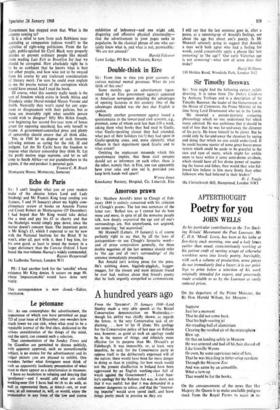Amorous prawn
Sir: Matthew Arnold's letter to Clough of Feb- ruary 1849 is entirely concerned with his criticism of Clough's poems. The last two sentences of the letter run: 'Reflect too, as I cannot but do here more and more, in spite of all the nonsense people talk, how deeply lilt poetical the age and all one's surroundings are. Not unprofound, not ungrand, not unmoving: but unpoetical.'
Mr Maxwell (Letters, 19 January) is of course perfectly right to say that, by all the laws of juxtaposition—to use Cough's favourite word— and of prose composition generally, the three double negatives of the last sentence should refer to 'the age and all one's surroundings' of the sentence immediately preceding.
But Arnold isn't writing prose for the press. He's stabbing down, higgledy-piggledy, hugger- mugger, for the closest and most intimate friend he ever had, notions about that friend's poetry that he feels urgently compelled to communicate.
I still say that the last sentence goes in, after a pause, as a summing-up of Arnold's feelings, not about the age but about Atic's poetry. Is Mr Maxwell seriously going to suggest that Arnold, a man we'd both agree who had a feeling for words, could conceivably apply a phrase like 'not unmoving' to 'the age'? 'Our early Victorian age is not unmoving'—what sort of sense does that make?
David Williams 110 Holden Road, Woodside Park. London N 12


































 Previous page
Previous page